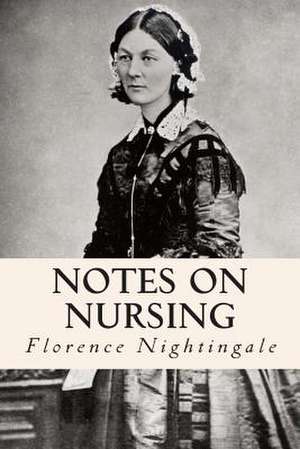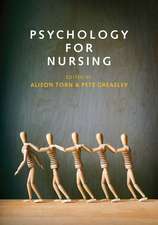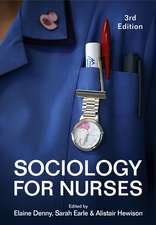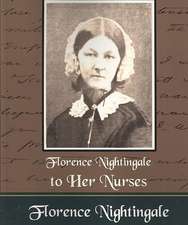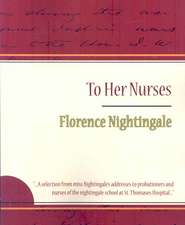Notes on Nursing
Autor Florence Nightingaleen Limba Engleză Paperback
Preț: 42.08 lei
Nou
Puncte Express: 63
Preț estimativ în valută:
8.05€ • 8.41$ • 6.65£
8.05€ • 8.41$ • 6.65£
Carte disponibilă
Livrare economică 25 martie-08 aprilie
Preluare comenzi: 021 569.72.76
Specificații
ISBN-13: 9781512261110
ISBN-10: 1512261114
Pagini: 116
Dimensiuni: 152 x 229 x 6 mm
Greutate: 0.16 kg
Editura: CreateSpace Independent Publishing Platform
ISBN-10: 1512261114
Pagini: 116
Dimensiuni: 152 x 229 x 6 mm
Greutate: 0.16 kg
Editura: CreateSpace Independent Publishing Platform
Descriere
Descriere de la o altă ediție sau format:
Be inspired by the timeless insights of the woman who created the foundations of modern nursing, with Florence Nightingale’s Notes On Nursing , the 160th Anniversary Edition.
Supported by essays from modern-day nurses, this still-relevant work offers concise, on-the-ground experience and breakthrough insights into the crucial elements of patient care. Each chapter brings to life Nightingale’s determination to advance the healthcare system of her time, empowering modern nursing professionals, educators, and students of all levels to establish their own crucial findings and innovations.
Power up your professional commitment by diving into Nightingale’s bravery and groundbreaking vision:
Foundational findings and instruction on the importance of adequate room ventilation, management of the patient’s environment, what it means to be in charge as a nurse, patient observation, nutrition, appropriate lighting, and cleanliness of beds and rooms
Supported by essays from modern-day nurses, this still-relevant work offers concise, on-the-ground experience and breakthrough insights into the crucial elements of patient care. Each chapter brings to life Nightingale’s determination to advance the healthcare system of her time, empowering modern nursing professionals, educators, and students of all levels to establish their own crucial findings and innovations.
Power up your professional commitment by diving into Nightingale’s bravery and groundbreaking vision:
Foundational findings and instruction on the importance of adequate room ventilation, management of the patient’s environment, what it means to be in charge as a nurse, patient observation, nutrition, appropriate lighting, and cleanliness of beds and rooms
- Seasoned guidance and reflections on Nightingale’s writings from experienced nurses, nurse educators, and professional development practitioners, including:
- The palliative care perspective
- Advanced nursing practice and midwifery
- The influence of the nurse on patient emotional state and overall well-being
- Professional identity and inspiration
- A tribute to Notes on Nursing
- Preparing to be a nurse educator
- Issues ranging from bedsores to global health care
- Offers Nightingale’s principles of health —her holistic viewpoint and understanding of how sickroom environment, patient mindset, and patient inner mental/emotional struggles affect health and recovery
- Emphasizes the importance of assisting in patient well-being on all levels of health and well-being
- Perfectly supports the current emphasis on research and evidence-based practice by using data to support arguments for offering compassionate, quality care—illuminates all levels of nursing practice, education, and research
Notă biografică
Florence Nightingale /¿nät¿n¿e¿l/, OM, RRC, DStJ (12 May 1820 - 13 August 1910) was a British social reformer and statistician, and the founder of modern nursing.
Nightingale came to prominence while serving as a manager and trainer of nurses during the Crimean War, in which she organised care for wounded soldiers.[3] She gave nursing a favourable reputation and became an icon of Victorian culture, especially in the persona of "The Lady with the Lamp" making rounds of wounded soldiers at night.[4][5]
Recent commentators have asserted Nightingale's Crimean War achievements were exaggerated by media at the time, but critics agree on the importance of her later work in professionalising nursing roles for women.[6] In 1860, Nightingale laid the foundation of professional nursing with the establishment of her nursing school at St Thomas' Hospital in London. It was the first secular nursing school in the world, and is now part of King's College London. In recognition of her pioneering work in nursing, the Nightingale Pledge taken by new nurses, and the Florence Nightingale Medal, the highest international distinction a nurse can achieve, were named in her honour, and the annual International Nurses Day is celebrated on her birthday. Her social reforms included improving healthcare for all sections of British society, advocating better hunger relief in India, helping to abolish prostitution laws that were harsh for women, and expanding the acceptable forms of female participation in the workforce.
Nightingale was a prodigious and versatile writer. In her lifetime, much of her published work was concerned with spreading medical knowledge. Some of her tracts were written in simple English so that they could easily be understood by those with poor literary skills. She was also a pioneer in data visualization with the use of infographics, effectively using graphical presentations of statistical data.[6] Much of her writing, including her extensive work on religion and mysticism, has only been published posthumously.
Cuprins
Introductory; 1. Ventilation and warming; 2. Health of houses; 3. Petty management; 4. Noise; 5. Variety; 6. Taking food; 7. What food; 8. Bed and bedding; 9. Light; 10. Cleanliness of rooms and walls; 11. Personal cleanliness; 12. Chattering hopes and advices; 13. Observation of the sick; Conclusion; Supplementary chapter.
